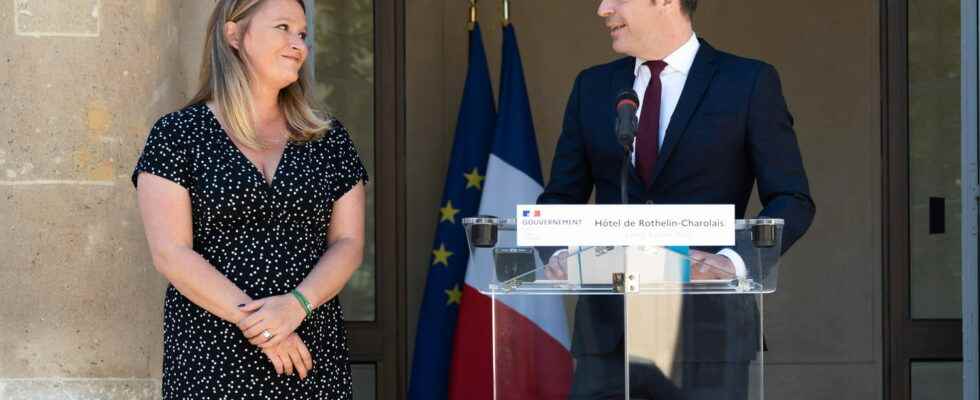REDESIGN. A reshuffle of the Borne government was unveiled on Monday July 4, 2022 by the Elysée. Here are the main changes to remember.
Less than two months after the previous reshuffle, Elisabeth Borne and Emmanuel Macron reviewed the composition of the government on July 4, 2022. An essential step after trying legislative elections for the executive: three ministers beaten in the ballot were forced by the Elysee to resign, while the controversy swelled around the Minister of Solidarity Damien Abad, accused of sexual violence and the subject of a preliminary investigation by the Paris prosecutor’s office. But above all, the first Borne government, formed on May 20, 2022 the day after the presidential election, was a tight team where several portfolios remained to be distributed. Less than a renewal, the reshuffle of July 4 was therefore an enlargement: only four ministers and secretaries of state left their functions, while 19 personalities joined the government.
During this ministerial reshuffle, some members of the first Borne government were also assigned a new portfolio, while others saw their skills broadened. The post of spokesperson, for example, went to Olivier Véran, former Minister Delegate for Relations with Parliament, while the former spokesperson, Olivia Véran, was given a post of Minister Delegate at Bercy. Gérald Darmanin, kept inside, has seen the responsibility for overseas territories and local authorities added to his portfolio.
Four members of the government left their functions on the occasion of this reshuffle. Three of them were forced to resign following their defeat in the legislative elections, three women. Amélie de Montchalin, first, appointed Minister of Ecological Transition and Territorial Cohesion in May, was replaced in this post by Christophe Béchu, former LR mayor of Angers. Brigitte Bourguignon was replaced by François Braun, former head of emergencies in Metz, at Health. Hervé Berville, MP for Côtes d’Armor, replaced Justine Benin as Secretary of State for the Sea.
This reshuffle also dismissed Damien Abad from the government, following several accusations of sexual violence, the filing of a complaint and the opening of a preliminary investigation by the Paris prosecutor’s office. It was therefore Jean-Christophe Combe, former director of the Red Cross, who took over the post of Minister of Solidarity, Autonomy and People with Disabilities. Let us add that the Minister of Overseas, Yaël Braun-Pivet, had left the government a week in advance to become President of the Assembly. His portfolio was annexed to that of the Minister of the Interior, Gérald Darmanin, supported by a Minister Delegate in charge of Overseas Territories, Jean-François Carenco, a senior civil servant and former prefect of Paris.
Five ministers of the first Borne government have been assigned a new portfolio in this reshuffle. Franck Riester, previously Minister Delegate in charge of Foreign Trade and Attractiveness, has been appointed Minister Delegate in charge of Relations with Parliament. He therefore recovered the post of Olivier Véran, who for his part was appointed Minister Delegate in charge of Democratic Renewal and government spokesperson. The former government spokesperson, Olivia Grégoire, has joined Bercy as Minister Delegate in charge of SMEs, Trade, Crafts and Tourism.
Let us add Clément Beaune, until then Minister Delegate in charge of European Affairs, who became Minister Delegate in charge of Transport, and Christophe Béchu who, from Minister Delegate in charge of Local Authorities, was promoted to the Ministry of Ecological Transition and the Cohesion of territories.
The government has been enriched by 19 new personalities. Among the main positions, we find François Braun at the Ministry of Health and Jean-Christophe Combe at the Ministry of Solidarity. Also note the return to government of Marlène Schiappa, who has become Secretary of State in charge of the Social and Solidarity Economy, of the former Minister of the Armed Forces Geneviève Darrieussecq, who has become Minister Delegate for People with Disabilities, and of Sarah El Haïry, appointed Secretary of State in charge of Youth and Universal National Service. Here is the detailed list of new entrants:
- François Braun, Minister of Health and Prevention
- Jean-Christophe Combe, Minister of Solidarity, Autonomy and People with Disabilities
- Jean-François Carenco, Delegate Minister for Overseas Territories
- Caroline Grandjean, Minister Delegate for Vocational Education and Training
- Roland Lescure, Minister Delegate for Industry
- Jean-Noël Barrot, Minister Delegate in charge of the Digital Transition and Telecommunications
- Caroline Cayeux, Minister Delegate in charge of Local Authorities
- Olivier Becht, Minister Delegate for Foreign Trade, Attractiveness and French Nationals Abroad
- Olivier Klein, Minister Delegate in charge of Cities and Housing
- Agnès Firmin Le Bodo, Minister Delegate in charge of Territorial Organization and Health Professions
- Geneviève Darrieussecq, Minister Delegate for People with Disabilities
- Laurence Boone, Secretary of State for Europe
- Bérangère Couillard, Secretary of State for Ecology
- Dominique Faure, Secretary of State in charge of Rurality
- Hervé Berville, Secretary of State for the Sea
- Sonia Backès, Secretary of State for Citizenship
- Patricia Mirallès, Secretary of State for Veterans and Remembrance
- Marlène Schiappa, Secretary of State for the Social and Solidarity Economy and Associative Life
- Sarah El Haïry, Secretary of State for Youth and Universal National Service
